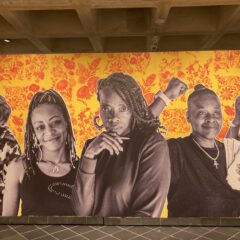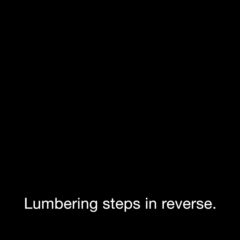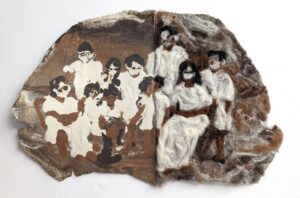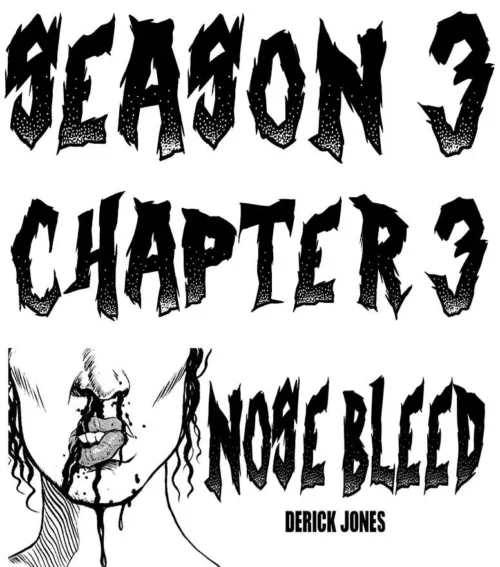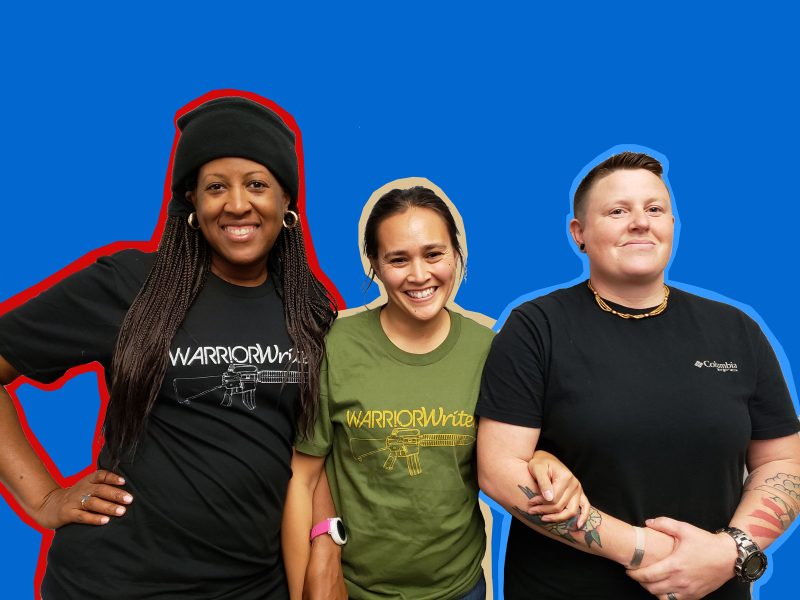
In observance of Veteran’s Day, our Managing Editor, Wit López, reached out to two organizations that are using the arts as a way to build community between veterans and non-veterans. The second organization featured in this podcast mini-series: Warrior Writers in Philadelphia, PA! Wit speaks with the founder, Lovella Calica, and two artists who are also veterans, Ginn McGill-Prather and Angela Waller about the ways Warrior Writers uses art and writing to transform veterans’s lives.
Wit López: Hello and welcome to another episode of Artblog radio. I’m your host for today, Wit Lopez. I’m super excited to be sitting here accompanied by Lovella Calica and Gill McGill- Prather who will be speaking with me today about the amazing work that’s being done over at Warrior Writers. Welcome to the show, Ginn and Lovella.
So Lovella, can you tell me a little bit more about the, the mission of warrior writers as an organization?
Lovella Calica: Yeah. Um, Warrior Writers is a veterans-centered arts organization. We were founded in 2007. We are a national organization based here in Philadelphia. Primarily. We do writing and arts workshops for veterans and service members and family members.
We also put on poetry readings and we publish anthologies and we do retreats.
Wit López: That’s wonderful. So are those anthologies that get published, are those available for folks to buy?
Lovella Calica: Yeah, you can purchase them on our website.
Wit López: That’s really great. That’s amazing. What exactly goes into the anthologies?
Lovella Calica: Um, a lot of poetry. It’s primarily poetry, but, um, people are welcome to submit other kinds of things. So there’s some, um, you know, prose in there, there’s some letters. There’s also visual art in the books.
Wit López: So I noticed on the Warrior web, uh, writer’s website. That it said, “Warrior Writers is veterans transforming their lives through art.”
Can you tell me a little bit more about that transformation or what you, how you view that transformation?
Lovella Calica: You know, I think it’s different for everybody. Um, but I, you know, I’ve definitely seen veterans who. Um, didn’t feel like they had a focus or purpose after the military and, um, discovered the arts and felt afterwards that they really found their calling and they really, um, found something that they enjoy doing and a community that, that they connected with.
And so, um, I think it really gives sort of purpose and direction for some people. Um, I know when we had a retreat in Martha’s vineyard a long time ago, um, somebody decided like, after that retreat to go into rehab, and some people have often, you know, decided to, you know, start seeking, um, treatment for mental health issues after
participating in warrior writers. Um, and I think it’s, you know, the main thing about it, it’s really feeling, starting to feel connected to a community of people who understand, um, and accept you for who you are.
Wit López: That’s wonderful. I think everyone needs that. Needs a community where they feel grounded and where other people around them can also understand what they are experiencing too.
So that’s, I’m glad to hear that Warrior Writers is doing that kind of work, that’s so necessary. So it’s called Warrior Writers. But when I was looking through the website, I saw that there were also opportunities for art. And I also recently spoke with some folks over in Branchburg, New Jersey at Frontline Paper, who said that they’ve worked with Warrior Writers before, and that they think it’s a brilliant organization and they think you’re an amazing person, so, so you’re not just doing writing.
Lovella Calica: Yeah, I mean, I, you know, writing is sort of, you know. Our primary tool. Um, and that’s where we started. But obviously, you know, people like to do a lot of different things and we like to support that. And we’ve also done things where we combine the visual art with the writing. Um, you know, really art as a tool for all of it, whatever kind of art.
Um, but primarily we do writing, um, and people, you know, we encourage and support people to do whatever kinds of artwork they want. Actually, this weekend we’re having a retreat and we’ll be having a graphic design workshop as well as a, um-
Wit López: Nice!
Lovella Calica: visual arts workshop led by AV who will probably be doing colored pencils and a chalk pastels.
Wit López: Wow. That’s really nice. I, I love pastels. I love, like, they’re, they’re so good for blending. I hate the crap that they leave under your fingernails, but I love them, otherwise. So Ginn, uh, so we were speaking a little while ago before we turned the mics on- and you had mentioned art in your own life.
Ginn McGill-Prather: Yup.
Wit López: Um, so, uh, I’m, I’m a huge fan of visual art. So do you get into visual art?
Ginn McGill-Prather: Uh, yeah! I dabble (chuckle)
Wit López: (laughter) That’s awesome. What, uh, what kind of visual art, if you don’t mind sharing.
Ginn McGill-Prather: Um, I guess it started out with a soft pastels and, um, I love Willow bark. Um, but, um, got into a lot of mixed media in the last few years, um, as well.
So a lot of found objects and, um, I’m all self taught, so, you know, very unconventional. Like, you know, what I decide to put together on the same canvas.
Wit López: That sounds amazing.
Lovella Calica: Ginn’s got tons of pieces of artwork. We actually exhibited some of them, um, at PAFA, the Pennsylvania Academy of fine arts a couple of years ago.
Ginn McGill-Prather: Yeah.
Wit López: Congratulations. That sounds really great. Yeah. I love found objects work. What uh, what kind of objects do you prefer to use in your work?
Ginn McGill-Prather: Oh, well, um, so I’ve used, um, mostly drywall as my canvas. Um, tons of, uh. Found dr– drywall. And, um, I also have incorporated a lot of items from my military years, or, uh, bits and pieces I find here and there that just seem interesting.
Wit López: That sounds amazing. I would love to see that work, especially on drywall. Like that’s, that sounds really cool!
Ginn McGill-Prather: Yeah, I some of it left, but like I was telling you earlier, went through a phase a little bit ago, probably about a year ago, where kind of took all of my stuff that I’ve been working on or, larger a finished items and threw them out at the curb for garbage pickup. So, uh,
Wit López: That’s cool. That’s perfectly fine. I know the feeling I have done similarly, (chuckle) so I understand.
Lovella Calica: Are a lot of the, um, the drywall pieces quite large, because they’re large pieces of drywall?
Ginn McGill-Prather: They are fairly large. Um, it’s hard to find framing materials for, for very large pieces, but.
Yeah. You can manage. And then a, I’ve come up with some ways of, uh, hanging it on its own. She using like contractor supplies.
Lovella Calica: And do you paint on those or do you pastel or what do you…
Ginn McGill-Prather: I mean, it’s like, uh, you name it. Like I have, like, I have a piece right now in my living room at home.
It’s a church and Savannah. And, um. On that one piece. It’s a spray paint, and acrylic, it’s got water color mixed in, along with pastels, and the Willow bark and, um, also some marker work.
Lovella Calica: So a little bit of everything,
Ginn McGill-Prather: A little bit everything. Yeah,
Wit López: I love that. I love that. I, I’m a huge fan of putting things together. So I love seeing how people combine different things to create what they imagine in their minds or feel on the inside.
Ginn McGill-Prather: What it comes down to it. I just don’t know what I’m doing. So yeah, I just mix things together and see what happens. Ultimately, you always get brown, but it turns out alright.
Lovella Calica: Experimenting is fun. You never know what’s going to happen until you try it.
Wit López: Right, exactly.
Lovella Calica: Espcially with drywall! I mean, I imagine that, like how it reacts to certain chemicals is different than what it would do on paper or canvas.
Ginn McGill-Prather: It’s very true. Um, what’s also pretty cool about it is that you can use the, the different compounds that you would actually use to fix patches in your house if you had a hole.
You can make it like plaster, and so you have 3D effects, or you can cut into it. And do reliefs. Um, or, uh, use resin and insert items. So it ends up being fairly heavy. I really recommend for just anyone.
Wit López: No, that’s cool. That’s cool though. That’s really, really nice. I like the idea of it, of using building materials to make it into a 3D thing.
That’s really cool. So when you do it, is it more abstract or do you have an image in mind? Um, so I’ve dabbled with abstract, but um, most of it is, I would say- it starts out therapeutic and then someone else will see and be like, Oh, wow, that’s really cool. Um, I see this. Or I see that, and I’m like.
All right. That’s fun… That’ll work. You know, like, it’s actually like this long expression, right. Of how I’m feeling inside at the moment based on this particular memory in my past. But, you know, that’s a lot of… who cares if they like it.
Wit López: I approve, I approve. I love that phrase. Just, yeah. Who cares. Right. That’s awesome. Uh, cause then you really know that you’re making it for you, right? Like if it’s not. If you’re not trying to cater to an audience specifically, then you know that it’s for you.
Ginn McGill-Prather: Yeah. It’s just, you know, whatever emotion I’m feeling at the time, kind of a vomited out onto the canvas.
Wit López: Amazing.
Lovella Calica: Have you been doing visual art for a long time?
Ginn McGill-Prather: Um, so the earliest sketchbook that I have is from 1990. Oh my God. I still have it. It’s horrible. It’s like a, it’s like me, it’s marker work. Cause I must have just gotten like some brand new crayolas or something at the time. And it’s a, it’s mostly myself, uh, doing skateboard tricks on half pipes and stuff.
Um, and uh, different animals. And, um, then this guy that I was really into back then, um, Gerardo. I did a portrait of him… ahhh, spelled his name wrong, but you know… I was 10, so….
Lovella Calica: So did you do art work throughout your military career or did it, and did it change during or after?
Ginn McGill-Prather: Did it change during or after? Um, I mean, yeah, depth was added.
Wit López: Hmm. Do you do any writing?
Ginn McGill-Prather: Poorly, yes. Um, yeah, I write just about how I take photography- and that’s, um, just poorly, um. I try. I’m glad that I came to warrior writers though. I came there originally because my wife kept pushing me into doing it. Um, she kept mentioning it and then like a year later I actually saw something about it and told her like it was my idea the whole time (laughter). She was like, I’ve been telling you about this the whole time! I’m like, I don’t remember. She’s like, Oh my God. The story of our marriage.
Lovella Calica: And that was the “Radio Silence?”
Ginn McGill-Prather: I showed up to something, I thought, before radio silence, but I don’t really remember. I just know I had just started like therapy, like for real.
Um, I had a really or time with the VA hospitals down South. And, um, finally got a really good, um, psychiatrist and psychologist up here at this VA, uh, the Philadelphia VA, and, uh, went away to a, like a seven week PTSD/ TBI program. And I’m so like a reboot, you know. So I was like finally ready to like try and get stuff, um, out.
And where writers help with that- because like you show up and there, you don’t have to really think or anything- they just give you a writing prompt, you know, and in a few minutes time, and all of a sudden you’re like, writing out the complexities of…. of war, you know. Stuff that you didn’t talk about with anybody. But it’s okay because you know, if you don’t go first, someone else is going to say something. Whenever they read, there’s a loud or whatever, that’s gonna like make them vulnerable. So then you’re like, okay, they can relate to what I have to say.
So it’s good to, to write it, but it’s even better, I think to say it out loud, like release it or whatever. Um, it’s like, it’s very therapeutic. You feel better afterwards, so
Wit López: That’s wonderful.
Ginn McGill-Prather: Yeah. So, no, I’m not a good writer.
Wit López: That’s okay.
Ginn McGill-Prather: But it’s, it’s helpful.
Wit López: That’s wonderful.
Lovella Calica: Do you feel like… that’s related to you sharing at the “radio silence,” the, the “radio silence” performance? Like that letter you wrote.
Ginn McGill-Prather: Yeah, I’m sure. Um. You know, meeting, meeting, all of ’em, all of the Iraqis that, you know, moved to Philadelphia. (They don’t like being called refugees. So I don’t really remember how exactly they like to be called, but, um, relocated here from Iraq).
Um, meeting with all of them and like, I don’t want to say like making my peace with them, but, um. Yeah, I had some, uh, some insight, um, epiphany’s also into, into myself.
I always thought I was a good person. Um, and then like kind of realized that maybe I wasn’t always a good person. Um. So that was, that was helpful to, to acknowledge and then to get past Yeah. Now I can just say, you know, I try to be a good person.
Wit López: That’s real, I appreciate you sharing that. Thank you.
So Lovella, um, are you a writer yourself?
Lovella Calica: Yeah, I’m a writer. I’m not a veteran, but I’m a writer. I’ve been writing. Core poetry since I was in elementary school. I have improved over the years. Um, and um, I have survived different kinds of trauma, not related to the military and, um, writing his been the thing that kind of helped me reflect and deal with and process and continue to live. And so I wanted to share some of the writing that I did with the veterans that I had met. And knew um, back before I started Warrior Writers. And so that’s kind of how it got started. I shared my poetry with them and said, you know, do you guys write?
And they did. And we sort of had an on the spot poetry session. And then, um, then I said to myself, like. This is amazing, and other people need to hear this. I can’t be the only one, like this is what’s happening in our country. You know, we only hear from the media and the generals, we don’t hear from service members themselves, so it has to get out there.
So I wanted to make a book and put their words out there, and also have a workshop where, you know, we could sit together and support each other in this process of. You know, writing, which is not always easy, um, to write some of this heavy stuff and for people who had been writing, but also for people who hadn’t tried it out and could use something like this.
And so that was my intention to have a workshop and a book. I never intended to start an organization, um, but once we started, it just kept, you know, kind of going and going and growing. So, yeah, that was a 2000 and– I guess 6, when I had the idea and then 7 we had our first workshop.
Wit López: That’s amazing. So you mentioned growth. How is warrior writers growing?
Lovella Calica: Um, we’ve got about 10 chapter- well 10 communities across the country, um, in nNw Orleans, Minneapolis, Boston, the Bay area, um, New Jersey. Um, as well as, you know, more and more people coming to Philadelphia and to these chapters around the country.
Um. We are not necessarily financially growing as much as we would like to. Um, but you know, more and more people are getting to know about us. Um, you know, people that I know are starting to tell me they’ve heard about Warrior Writers from someone else. Um, and so I think, yeah, you know, the word is spreading out there about Warrior Writers, um, you know, being in so many different cities now and having, you know, a bunch of books out there.
And then specifically in Philadelphia, I think we’re pretty well known because we’ve been, you know, doing programming here for a long time, partnering with the Kimmel and the library and the Rosenbach in the Wilma, a lot of different places. Um, so we’ve sort of been presented or co-sponsoring or connected with a lot of, um, you know, veterans or war related programming around the city.
Wit López: That’s wonderful. I’m glad for the work that you do. Um, so you mentioned a partnership with the Kimmel, and I know that you have an event coming up. Could you talk a little bit more about that event?
Lovella Calica: Yeah, we’re really excited to, um, continue building with the Kimmel center. Um. Jay Walder artistic director is that is a huge, Warrior Writers fan and we really, really appreciate his support.
Um, we’re going to be doing a show on Sunday, this Sunday, November 10th, which is, um, the Marine Corps birthday and the day before Veterans day. The show is at 3:00 PM at the Kimmel center downtown. Um, and it’ll be, um, several veterans who are collaborating with a local musician. Luke Carlos O’Reilly, um, and he’s a jazz musician.
There’ll be two other musicians joining him, and there’ll be just sort of musical poetry and music collaborations that they’ve been working on over the course of the week. Um, so there’ll be some Philadelphia based poets as well as some folks from around the country, and it’s going to be a really amazing show and hope you guys can come out.
The show is called “Traveling Outside the Wire,” and it’s Sunday at 3:00 PM at the Kimmel center.
Wit López: That’s amazing. That’s a really, like, I looked at the advertisement for it and I was like, Oh, that’s so good. So I really do hope that a lot of folks come out to see it. Do you have any other events coming up, um, for Warrior Writers as an organization?
Lovella Calica: Yeah, we have a Veterans Day retreat this weekend. Um, it’s being hosted at the Chamonix Mansion. Um, we’ve got about 50 or 60 veterans coming from around the country. Um. We intended originally and had a goal of 25, and we very much surpassed that goal. (laughter) Um, and yeah, we’ll be showing the digital stories that some of our veterans and Iraqi friends made on Friday evening.
And then. Um, some of our Iraqi friends are, are giving a cooking class, um, featuring dolma and some, some traditional Iraqi food.
Um, Saturday we will be on site doing facilitater’s training and workshops. And then Sunday we’ll be, you know, at the Kimmel center. So if you’re interested, you can check online and our website warriorwriters.org and join us for that.
We also have, um, a workshop at Rutgers Camden on November 16th, which is, uh, next Saturday, um, from 11:00 AM to 1:00 PM. You could find information about that on our website.
And we also have, uh, a fundraising campaign going on right now until, um, veteran’s day. Uh, you can go to our website, warriorwriters.org, uh, to find out more information about that.
Wit López: Wonderful. That’s really amazing. That’s, that’s fantastic. So one time I came into culture, words, uh, which is the fiscal sponsor that Artblog is under, and I believe it’s your fiscal sponsor as well. And I saw you sitting at a table and you were in here waiting for a few other people to come. And there were a lot of other folks who are kind of facilitating different things.
I can’t remember when this was, it was a few months back as a few months back. Um, was that a convening of some sort?
Lovella Calica: I’m not sure which thing you’re talking about, but we did the Memorial day weekend. Um, we had a wellness day. So, um, you know, we really believe in wellness and, and, uh, taking a holistic view of veterans, um, and trying to support them in care outside of traditional.
You know, care at the VA, which is a lot of times to talk therapy and medication, um, which doesn’t work for everybody. And also we just really want people to try new things and different things. And so, yeah, we’ve had several, um, wellness days or wellness sessions. We’re going to be offering it at the retreat this weekend.
So, um. Sarah from West Philly community acupuncture, often volunteers for that. So she’s, she’s volunteered to give acupuncture and she’s coming this weekend. Um, we’ve got some friends that do Reiki. I think we had chakra cleansing that weekend. Um, I do something called TRE, tension and trauma releasing exercises, who’ve got someone doing yoga and someone doing restorative yoga this weekend.
So we have a variety of different types of, um, wellness opportunities. And that might’ve been, um, what we were doing there..
Ginn McGill-Prather: Restorative yoga?
Lovella Calica: Yeah. It’s like trauma, restorative yoga or something like that. I don’t remember the exact name, but it’s, she works specifically with, um, veterans with PTSD, so.
Wit López: Wow. That’s new for me. So also here with us today is another participant in a warrior writers, Angela Waller. And, um, Angela, are you a writer too?
Angela Waller: Yes. I like to write.
Wit López: What do you write?
Angela Waller: I like to write poetry. Short stories.
Wit López: Are you, is any of your work in the anthologies for warrior writers?
Angela Waller: Not in any of the anthologies, but they are published in some of the chap books.
Wit López: Oh, nice. Nice. I didn’t know that there were chap books! Can you tell me a little bit more about that?
Angela Waller: Sure. Lovella will. (laughter)
Lovella Calica: Yeah. We have work in DC a few times a year and, um, we work at the USO and we bring together active duty service members to work both with Warrior Writers and, um, Combat Paper or Frontline Paper where they do handmade paper out of military uniforms. And we work with folks for a whole week. And then at the end of the week, uh, we have an art exhibit and we have a short chap book, um, of the writing that was written during that week. So we get folks for a whole week and that’s where we met Angela.
Wit López: That’s really wonderful. So you’re familiar with Frontline Paper they’re, they’re such a great organization. Have you worked with them before?
Angela Waller: Yes, I met Lovella couple of years ago, so I got to work with her a few times with the Combat Paper workshop and the exhibit.
Wit López: That’s wonderful. So when you were with Combat Paper or Frontline Paper, (as they changed their name)
Angela Waller: oops sorry!
Wit López: It’s fine, It’s fine. Um, were you making paper? From uniforms?
Angela Waller: Yes, I did get the opportunity to make paper from uniforms. That was a great experience.
Wit López: That’s wonderful. I’m really glad to hear that. Thank you so much for sharing. I appreciate that. Thank you to all three of you for sharing your yourselves, for sharing your art practices, for sharing about this work that you’re doing with warrior writers.
This is all very, very exciting and, uh, I look forward to all the things that are going to be coming out of your work. In the future. I think it’s really wonderful, really, really wonderful and best of luck with the events that you’re having this weekend. I hope that they all go really well and that everyone enjoys themselves.
So thank you again for stopping by Artblog radio. For those of you who are listening, you can listen to this podcast on Artblog’s website. You can also listen to it on Apple podcast or on Spotify. Thanks so much for listening. Have a good one. Bye y’all.
You can listen to Artblog Radio on Apple Podcasts and Spotify. HUGE Shoutout to Kyle McKay for our new intro and outro music.



